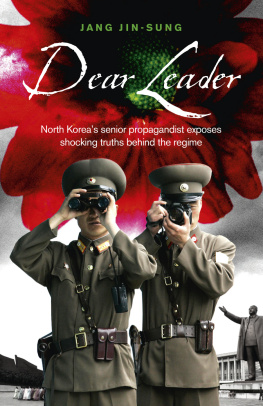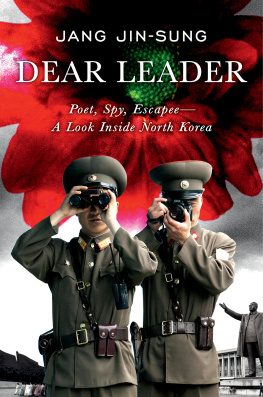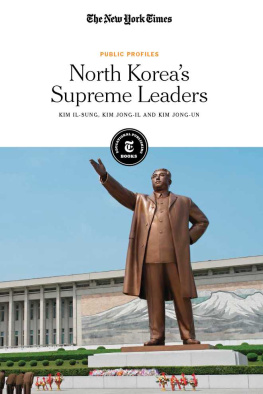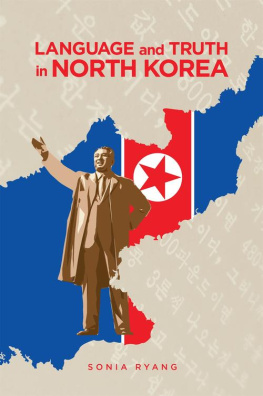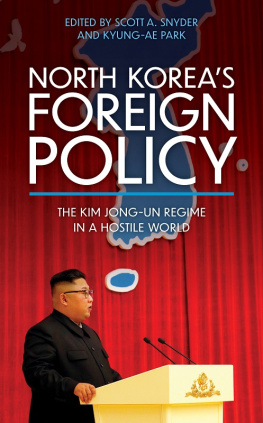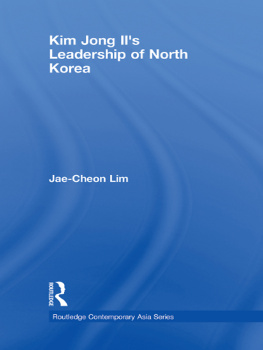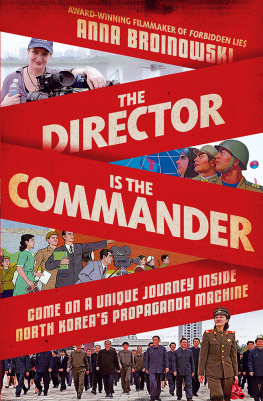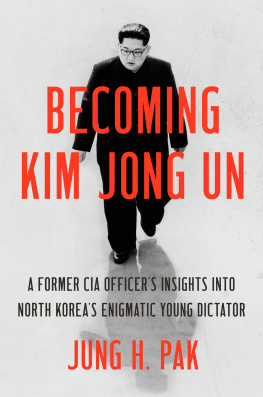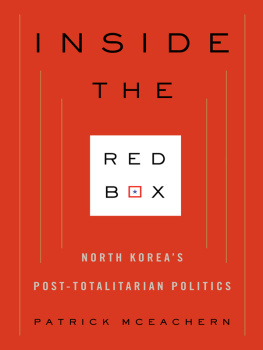About the Book
Dear Leader contains astonishing revelations about North Korea that could only be disclosed by a regime insider.
Jang Jin-sung worked at the heart of North Koreas propaganda machine. Young and ambitious, he had access to state secrets, including information about military and diplomatic policies, and the distribution of power. He was also one of the Hermit Kingdoms leading poets, whose work secured him an audience with Kim Jong-il himself. As one of the Admitted, he had every reason to feel satisfied with his lot.
Yet he could not ignore his conscience, or the contrast between his life and that of those he saw starving on the street. After breaking security rules, he and a friend were forced to flee for their lives.
This is the gripping true story of Jang Jin-sungs escape to freedom, and a shocking expos of the worlds most secretive totalitarian state.
About the Author
Jang Jin-sung is a former court poet, and propagandist, for North Korean leader Kim Jong-il. Since leaving the country he has become a bestselling author and media sensation. He has been awarded the Rex Warner Literary Prize and read his poetry at Londons Cultural Olympiad in 2012. He now lives in South Korea and is Editor-in-Chief of New Focus International, an authoritative website reporting on North Korea (http://newfocusintl.com).
This ebook is copyright material and must not be copied, reproduced, transferred, distributed, leased, licensed or publicly performed or used in any way except as specifically permitted in writing by the publishers, as allowed under the terms and conditions under which it was purchased or as strictly permitted by applicable copyright law. Any unauthorized distribution or use of this text may be a direct infringement of the authors and publishers rights and those responsible may be liable in law accordingly.
Version 1.0
Epub ISBN 9781448177424
www.randomhouse.co.uk
1 3 5 7 9 10 8 6 4 2
First published in 2014 by Rider, an imprint of Ebury Publishing
Ebury Publishing is a Random House Group company
Text copyright 2014 by Jang Jin-Sung
Translation copyright 2014 by Shirley Lee
Jang Jin-Sung has asserted his right to be identified as the author of this Work in accordance with the Copyright, Designs and Patents Act 1988.
All rights reserved. No part of this publication may be reproduced, stored in a retrieval system, or transmitted in any form or by any means, electronic, mechanical, photocopying, recording or otherwise, without the prior permission of the copyright owner.
The Random House Group Limited Reg. No. 954009
Addresses for companies within the Random House Group can be found at
www.randomhouse.co.uk/offices.htm
A CIP catalogue record for this book is available from the British Library
Hardback ISBN 9781846044199
Trade Paperback ISBN 9781846044205
To buy books by your favourite authors and register for offers, visit
www.randomhouse.co.uk
I FIRST MET Mr Jang in June 2012. He had come to London to take part in Poetry Parnassus, hosted by the Southbank Centre as part of the summer Olympic Games. A Korean studying in England, I had been asked to interpret for both North and South Korean representatives. As I waited for him to come through at the arrivals hall at Heathrow Airport, I looked at my phone to check the photograph of him I had found on the Internet: in it, he was dressed in a dark suit, smiling a little and looking up at the camera under the curls of his black hair.
When he walked into the arrivals hall pushing a luggage trolley, his hair was dishevelled and he looked half-submerged in his navy blue suit. His white cuffs poked unevenly from his jacket sleeves and his light pink tie did not sit quite straight. We exchanged greetings in Korean, bowed and shook hands. As we walked to the car I pushed the trolley. He opened the door of the black van for me and held out his hand to steady me as I climbed the steps.
When we set off for the Southbank Centre, he hung a camera around his neck, while I prepared myself to make conversation. I pointed out Londons sights for him as he snapped shots and admired the landmarks. Among those buildings I pointed out was the MI6 headquarters at Vauxhall Cross, and I took my chance to break the ice between us: Apparently, this is where women who want to snag a James Bond type hang out. Suddenly, the rather formal atmosphere between us evaporated and he burst into laughter. He said that if those women ever found out that real spies were just people like him, they might stop waiting and go find themselves a proper man.
By the end of his stay, we had become friends, talking easily instead of in the formal manner of those from neighbouring nations who had become distant strangers after half a century without contact. Even today, North Koreans are not permitted to communicate freely with anyone from the outside world not by email, not by phone, not in person.
It doesnt help that media portrayals of North Korea, based on an outsiders perspective, focus on the inscrutability of its system: the strange dynasty of Kims, the endless heavy boots marching in line or the uneasy prospect of its nuclear arsenal. There is far more to its people than the public shows of mass obedience and hysterical tears the North Korean experience is a complex and dysfunctional relationship between a system and the people ensnared by it, of which Mr Jang is a unique witness. Not only did he live at its heart, but he escaped from it.
In this book, he ends his account in 2004, and some things have changed in North Korea since then. Informal and illegal marketisation from below, rising from the ashes of North Koreas economic collapse in the mid 1990s, has continued to impact significantly on the nature of social transactions conducted between individual and state. The purge and execution in December 2013 of Jang Song-thaek, uncle to the current ruler Kim Jong-un, made headlines across the world. The graphic accusations against him were published in a very public manner by being broadcast on state television and released quickly to a foreign audience; and the incident was noted for breaking from the past in many ways.
But these events did not occur in a historical vacuum and, in order to make sense of North Koreas present, you have to know its past. Particularly, you have to recognise its persistent dualities between words and deeds, propaganda and reality, and the manner in which these dualities work for the outsider versus the insider. Without an appreciation of this, North Korea will remain inscrutable and our exchanges cyclical.
Mr Jang was not a politician but a poet, and this is precisely why he is intimately familiar with the regimes myth-making, and why his memoir is about the dismantling of faades. The outside worlds approach to North Korea is based on many deceptions, for which all sides are responsible, and on which the status quo depends; Mr Jangs escape from North Korea really began when he realised: I was restless with yearning to write realist poetry based on what I saw, and not loyalist poetry based on what we were all told to see.
It remains impossible for an outsider to gain access to the states internal workings by doing business with or making trips to North Korea. Not only are there strict layers of control and hidden power structures in place, but proxies and agents are deliberately disguised as prominent insiders whenever North Korea deals with foreigners and presents itself to the world. It has also long been thought that no defector can speak with authority on the workings of the system, due to its highly compartmentalised nature. In this respect, Mr Jang is a clear exception.
Next page
